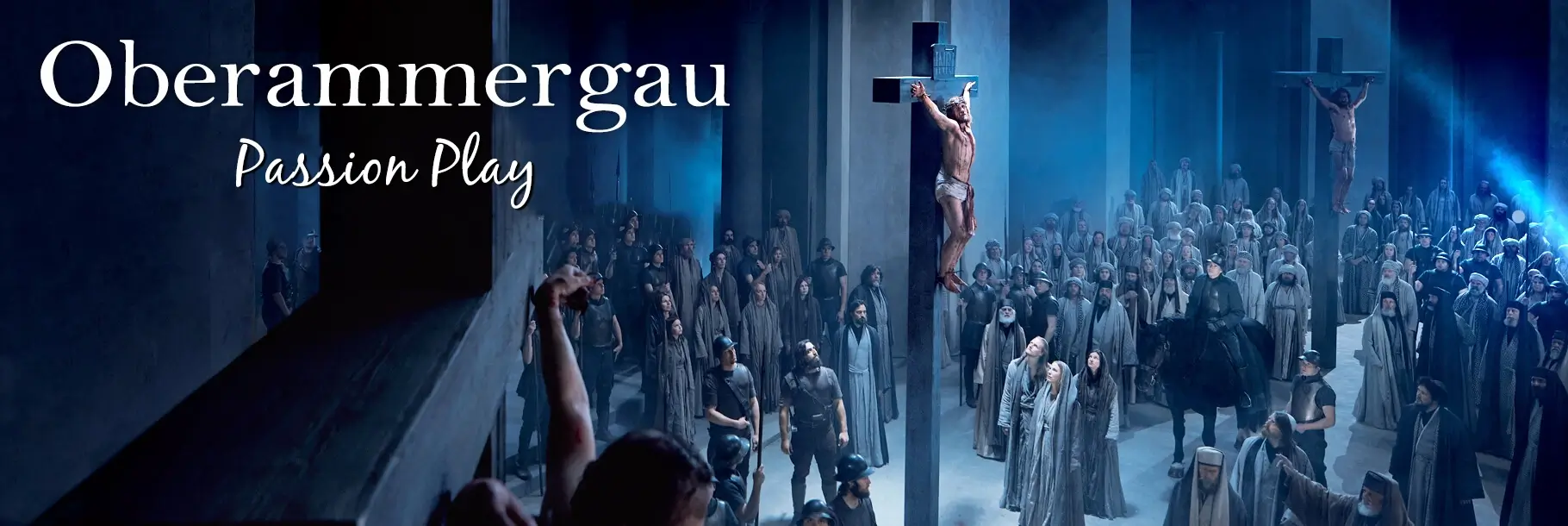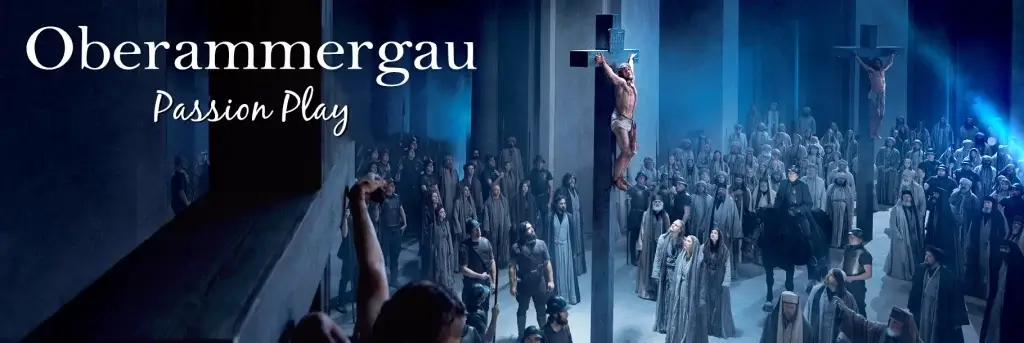Oberammergau Passion Play 2030: A Profound Catholic Pilgrimage Experience
The Oberammergau Passion Play, a centuries-old tradition rooted in Catholic faith, will return in 2030, drawing pilgrims from across the globe to the small Bavarian village of Oberammergau, Germany. Performed every ten years since 1634, this dramatic reenactment of Christ’s Passion, Death, and Resurrection stands as a testament to the enduring power of faith and devotion. For Catholics, attending the Passion Play is more than a theatrical experience—it is a spiritual journey that deepens one’s connection to Jesus Christ and His Blessed Mother, Mary. This sacred event, born from a vow made during a time of plague, continues to inspire and uplift, offering a unique opportunity to reflect on the mysteries of salvation.
The Passion Play’s origins trace back to 1633, when the villagers of Oberammergau, ravaged by the Black Death, pledged to perform a play depicting the life, suffering, and triumph of Jesus Christ if God spared them further loss. Miraculously, the plague ceased, and the villagers fulfilled their promise, staging the first performance in 1634. This act of gratitude has continued unbroken (with rare exceptions) for nearly four centuries, making it one of the oldest continuous expressions of Catholic devotion in the world. The play’s enduring legacy reflects the villagers’ commitment to glorifying God through art and storytelling.
At the heart of the Oberammergau Passion Play is the story of Jesus Christ, the Savior who offered Himself for the redemption of humanity. The narrative begins with His triumphal entry into Jerusalem and unfolds through key moments: the Last Supper, His betrayal, trial, Crucifixion, Resurrection, and Ascension. Each scene is crafted with reverence, drawing from Sacred Scripture and Catholic tradition. The play’s vivid portrayal of Christ’s sacrifice invites pilgrims to meditate on His infinite love and the cost of our salvation, fostering a deeper appreciation for the Paschal Mystery.
The Blessed Virgin Mary, Mother of God, plays a central role in the Passion Play, embodying sorrow and steadfast faith. As the Sorrowful Mother, Mary stands by her Son during His Passion, her heart pierced as foretold by Simeon (Luke 2:35). Her presence in the play underscores her unique role in salvation history as the one who bore the Savior and shared in His suffering. For Catholics, Mary’s example of trust in God’s will, even in the face of unimaginable pain, serves as a model of discipleship and a call to unite our own sufferings with Christ’s.
Catholic saints, whose lives reflect the virtues of Christ and Mary, are deeply connected to the themes of the Passion Play. St. John the Apostle, who stood with Mary at the foot of the Cross, exemplifies loyalty and love. His presence in the play reminds pilgrims of the call to remain faithful to Jesus, even in moments of trial. St. Mary Magdalene, a witness to the Crucifixion and the first to see the Risen Christ, embodies repentance and devotion. Her transformation from sinner to saint inspires Catholics to seek God’s mercy and grace.
St. Peter, the rock on whom Christ built His Church, also figures prominently in the Passion Play. His denial of Jesus and subsequent repentance highlight the reality of human weakness and the power of divine forgiveness. For pilgrims, Peter’s journey serves as a reminder that even those who falter can be restored through God’s mercy. The play’s depiction of these saints invites Catholics to reflect on their own spiritual journey and strive for holiness in imitation of these holy men and women.
The Oberammergau Passion Play is not merely a historical reenactment but a living expression of Catholic faith. Performed by over 2,000 villagers—actors, musicians, and crew, all of whom must be born in Oberammergau or have lived there for at least 20 years—the play is a communal act of worship. The dedication of the villagers, many of whom are descendants of the original performers, reflects the Catholic principle of offering one’s talents to glorify God. This authenticity resonates with pilgrims, who witness a community united in faith.
The play’s setting in Oberammergau, a picturesque village nestled in the Bavarian Alps, enhances its spiritual impact. Surrounded by majestic mountains and adorned with religious frescoes known as Lüftlmalerei, Oberammergau exudes a sacred atmosphere. The open-air Passion Play Theatre, with its 4,500 seats, offers a stunning backdrop of alpine scenery, creating an unforgettable setting for this sacred drama. Pilgrims attending the 2030 performances, running from May to October, will experience a five-hour presentation filled with music, tableaux vivants, and heartfelt performances.
For Catholics, the Passion Play is a pilgrimage destination that strengthens faith and fosters communion with God. The event aligns with the Church’s call to contemplate the mysteries of Christ’s life, particularly during the liturgical seasons of Lent and Easter. By witnessing the Passion Play, pilgrims are invited to walk with Jesus and Mary through the events of Holy Week, deepening their understanding of the sacrifice that redeemed the world. This experience can inspire a renewed commitment to prayer, sacrifice, and charity.
Catholic pilgrimages to the Oberammergau Passion Play in 2030 offer a unique opportunity to combine spiritual enrichment with cultural exploration. Many pilgrimage itineraries include visits to nearby shrines and holy sites, enriching the journey with encounters with other saints and sacred places. For example, pilgrims may visit the Shrine of Our Lady of Altötting, Germany’s most significant Marian pilgrimage site, where a 13th-century statue of the Blessed Virgin is venerated for its miraculous intercession. This shrine, located near Oberammergau, draws Catholics seeking Mary’s maternal care.
Another popular stop on Passion Play pilgrimages is the Wieskirche, or Church of the Scourged Redeemer, a Rococo masterpiece in Steingaden. This church, a UNESCO World Heritage Site, houses a statue of the Scourged Savior that reportedly shed tears in 1738, leading to numerous miracles. Pilgrims can offer prayers and celebrate Mass here, connecting their visit to the Passion Play’s themes of Christ’s suffering and redemption. These sacred sites enhance the pilgrimage experience, offering moments of reflection and grace.
Pilgrimage itineraries often extend beyond Germany to include other Catholic landmarks in Europe. For instance, some tours visit Salzburg, Austria, where pilgrims can explore the 17th-century cathedral and the Benedictine Abbey of St. Peter, both founded by St. Rupert. Others may include stops in Munich to visit the Frauenkirche, the city’s iconic cathedral, or Neuschwanstein Castle, a testament to Bavaria’s Catholic heritage. These destinations provide a broader context for the Passion Play, immersing pilgrims in the rich tapestry of European Catholicism.
A pilgrimage to the Oberammergau Passion Play is a journey of faith, drawing Catholics closer to Jesus and Mary through the intercession of the saints. The play’s emphasis on Christ’s Passion aligns with the spirituality of saints like St. Francis of Assisi, who bore the stigmata and lived in intimate union with Christ’s suffering. Similarly, St. Teresa of Ávila, a Doctor of the Church, taught the importance of meditating on the Passion to grow in love for God. Pilgrims can draw inspiration from these saints as they witness the play’s powerful depiction of Christ’s sacrifice.
The communal aspect of the Passion Play reflects the Catholic understanding of the Church as the Body of Christ. Just as the villagers of Oberammergau come together to present this sacred drama, pilgrims unite in a shared experience of worship and reflection. This sense of community mirrors the lives of saints like St. Benedict, whose Rule emphasizes the importance of communal prayer and work. The Passion Play becomes a living icon of the Church’s mission to proclaim the Gospel and honor Christ’s redemptive love.
For those planning to attend the 2030 Passion Play, early preparation is essential due to high demand for tickets. Pilgrimage companies like 206 Tours and Blue Heart Travel, which have decades of experience organizing Catholic pilgrimages, offer packages that include guaranteed tickets, accommodations, and guided tours. These operators ensure a seamless experience, allowing pilgrims to focus on the spiritual aspects of their journey. Many packages also include daily Mass with Catholic priests, providing opportunities for the Eucharist and Confession.
A typical pilgrimage itinerary might begin in Munich, where pilgrims can visit St. Peter’s Church and the Marienplatz before traveling to Oberammergau. Some tours extend to the Holy Land, connecting the Passion Play with the sacred sites of Jerusalem, Bethlehem, and Nazareth, where Jesus and Mary lived. For example, Blue Heart Travel’s 2022 itinerary combined Oberammergau with a visit to the Via Dolorosa and the Church of the Holy Sepulchre, creating a profound link between the play and the historical events it portrays. Similar itineraries are expected for 2030.
The Passion Play’s historical significance is enriched by its adherence to Catholic doctrine. In the 19th century, the play received a Missio Canonica, a certification from the Catholic Church affirming its fidelity to Church teachings. While this approval was briefly withdrawn in 1970 due to concerns over outdated portrayals, subsequent revisions ensured alignment with the Second Vatican Council’s teachings, particularly Nostra Aetate, which clarified the Church’s stance on the Jewish people. Today, the play is a faithful representation of Catholic belief, focusing on Christ’s universal call to salvation.
The Oberammergau Passion Play also offers a chance to engage with the local Catholic culture. The village’s woodcarving tradition, a centuries-old craft, produces sacred images of Christ, Mary, and the saints, which pilgrims can purchase as devotional items. The Pilatushaus, a center for woodcarving, showcases artisans at work, reflecting the Catholic value of offering one’s talents to God. These cultural elements deepen the pilgrimage experience, connecting faith with art and tradition.
As a Catholic pilgrimage, the Oberammergau Passion Play encourages spiritual renewal and conversion. The play’s tableaux vivants, which depict Old Testament scenes alongside the Passion, highlight the continuity of God’s plan of salvation, fulfilled in Christ. This theological depth resonates with the writings of saints like St. Augustine, who emphasized the harmony between the Old and New Testaments. Pilgrims are invited to see themselves as part of this divine story, called to live out their faith with courage and love.
In conclusion, the Oberammergau Passion Play 2030 is a once-in-a-decade opportunity for Catholics to immerse themselves in the mystery of Christ’s Passion and the intercession of Mary and the saints. This pilgrimage is a journey of faith, community, and cultural enrichment, offering a chance to grow closer to God while exploring the spiritual heritage of Bavaria and beyond. By attending the Passion Play, pilgrims honor the legacy of a vow made nearly 400 years ago and participate in a living tradition that proclaims the Gospel to the world. Plan now to secure your place in this extraordinary event, and let the Passion Play inspire you to deepen your devotion to Jesus and His Blessed Mother.


